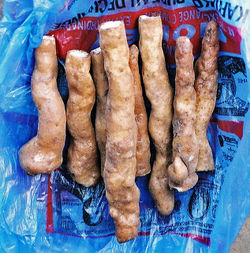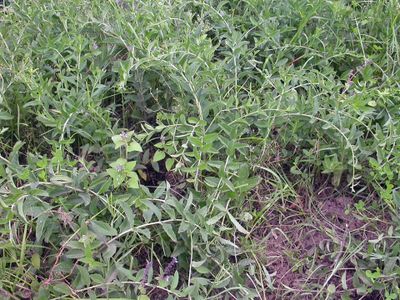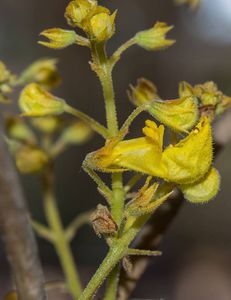Difference between revisions of "Coleus esculentus"
From PlantUse English
m (Michel Chauvet moved page Plectranthus esculentus to Coleus esculentus) |
Eléa HEBERLE (Talk | contribs) |
||
| Line 1: | Line 1: | ||
{{Species page (seed plant) | {{Species page (seed plant) | ||
| − | |image = | + | |image = Coleus esculentus tubercules Scamperdale.jpg |
|legend = | |legend = | ||
| − | |author = | + | |author = <br>(N. E. Br.) G. Taylor |
| − | |order = | + | |order = Lamiales |
| − | |family = | + | |family = Lamiaceae |
| − | |genus = | + | |genus = Coleus |
| − | |nb chromosomes = 2n = | + | |nb chromosomes = 2n = 24 |
| − | |origin = | + | |origin = Tropical Afrika |
|status = wild or cultivated | |status = wild or cultivated | ||
| − | |english = | + | |english = Kaffir potato |
| − | |french = | + | |french = Coléus à racine comestible |
}} | }} | ||
| − | |||
| − | |||
{{Box | {{Box | ||
|title = Uses summary | |title = Uses summary | ||
|color = lightgreen | |color = lightgreen | ||
| − | |text = | + | |text = *starchy tuber |
| + | * leaves: occasional vegetable | ||
| + | * medicinal | ||
}} | }} | ||
== Description == | == Description == | ||
| − | + | <gallery mode="packed"> | |
| + | File:Coleus esculentus plante Scamperdale.jpg|Whole plant | ||
| + | File:Plectranthus esculentus00.jpg|flowers | ||
| + | </gallery> | ||
| + | * perennial plant, with thick and fleshy rhizomes | ||
| + | * aerial erect and hairy stems erect 0.5-1.5 m | ||
| + | * spikes or cymes devoid of bracts, bearing flowers with elongated yellow corolla, emerging on the marcescent stems, more or less recumbent (Chevalier) | ||
== Popular names == | == Popular names == | ||
{| class="wikitable" style="width:100%;" | {| class="wikitable" style="width:100%;" | ||
| + | | English | ||
| + | | kaffir potato, Livingstone potato, African potato, coleus potato, finger potato | ||
| + | |- | ||
| + | | French | ||
| + | | Coléus à racine comestible, Coléus d’Afrique du Sud, Dazo, Pomme de terre Kaffir | ||
| + | |- | ||
| + | | Kinyarwanda | ||
| + | | Uruhombo | ||
| + | |- | ||
| + | | Afrikaans | ||
| + | | Wilde aartappel, Veldaartappel | ||
| + | |- | ||
| + | | Xhosa | ||
| + | | itapile | ||
| + | |- | ||
| + | | Shona | ||
| + | | tsenza | ||
| + | |- | ||
| + | | Venda | ||
| + | | mutada | ||
| + | |- | ||
| + | | Zulu | ||
| + | | ujango, ujilo, umbondwe, umhlaza | ||
| + | |- | ||
| + | | Ndebele | ||
| + | | umbondiwe | ||
|} | |} | ||
| + | |||
== Classification == | == Classification == | ||
| + | ''Coleus esculentus'' (N. E. Br.) G. Taylor (1931) | ||
| + | |||
| + | basionym : | ||
| + | *''Plectranthus esculentus'' N. E. Br. (1894) | ||
| + | |||
| + | synonyms : | ||
| + | *''Plectranthus floribundus'' N. E. Br. (1894) | ||
| + | *''Coleus dazo'' A.Chev. (1905) | ||
| + | *''Coleus floribundus'' (N.E.Br.) Robyns & Lebrun (1928), nom. illeg., non ''C. floribundus'' Baker | ||
== Cultivars == | == Cultivars == | ||
== History == | == History == | ||
| + | <gallery mode="packed"> | ||
| + | </gallery> | ||
| + | Chevalier already noted in 1953 the regression of the culture of this species. | ||
== Uses == | == Uses == | ||
| + | {{Citation box | ||
| + | |text= Grown as a traditional food plant in tropical Africa. Recently in danger of extinction. The farinaceous tubers are eaten cooked, sometimes raw, or pickled. Different centres of cultivation (Burkina Faso, Kano and Zaria in Nigeria, Ubangi and Lower Congo, Zambia, Malawi and Zimbabwe) have developed their own cultivars. | ||
| + | |author =Mansfeld. | ||
| + | }} | ||
== References == | == References == | ||
| + | * Chevalier, Auguste & Perrot, Emile, 1905. Les ''Coleus'' à tubercules alimentaires. in ''Végétaux Utiles de l'Afrique tropicale française'', Vol. I, fasc. 1, p. 100-152. | ||
| + | * Chevalier, Auguste, 1930. Notes et actualités. Une plante vivrière africaine : le ''Coleus floribundus'' et ses variétés. ''Revue de botanique appliquée et d'agriculture coloniale'', '''10''' (104) : 254-255. [www.persee.fr/doc/jatba_0370-3681_1930_num_10_104_4852 Persée]. | ||
| + | * Chevalier Auguste, 1938. Les Labiées cultivées ou utilisées dans les Pays tropicaux. ''Revue de botanique appliquée et d'agriculture coloniale'', '''18''' (203) : 470-488. [https://doi.org/10.3406/jatba.1938.5884 doi : 10.3406/jatba.1938.5884] | ||
| + | * Chevalier, Auguste, 1953. Labiées du Genre ''Coleus'' Loureiro cultivées dans les Pays tropicaux de l'Ancien Monde. ''Revue internationale de botanique appliquée et d'agriculture tropicale'', '''33''' (369-370) : 334-341. [https://doi.org/10.3406/jatba.1953.6788 doi : 10.3406/jatba.1953.6788] | ||
| + | *''Lost Crops of Africa. Volume II: Vegetables'', 2006. Washington, National Academies Press. 354 p. [https://www.nap.edu/read/11763/chapter/1 en ligne] | ||
== Links == | == Links == | ||
| + | *[http://www.ville-ge.ch/musinfo/bd/cjb/africa/details.php?langue=fr&id=116854 BD des Plantes d'Afrique] | ||
*[http://www.biodiversitylibrary.org/search.aspx?SearchTerm=Plectranthus%20esculentus&SearchCat= BHL] | *[http://www.biodiversitylibrary.org/search.aspx?SearchTerm=Plectranthus%20esculentus&SearchCat= BHL] | ||
*[http://ecocrop.fao.org/ecocrop/srv/en/cropFindForm FAO Ecocrop] | *[http://ecocrop.fao.org/ecocrop/srv/en/cropFindForm FAO Ecocrop] | ||
| − | *[ | + | *[https://npgsweb.ars-grin.gov/gringlobal/taxon/taxonomydetail?id=400149 GRIN] |
| − | + | ||
| − | + | ||
*[http://www.ipni.org/ipni/simplePlantNameSearch.do?find_wholeName=Plectranthus%20esculentus&output_format=normal&query_type=by_query&back_page=query_ipni.html IPNI] | *[http://www.ipni.org/ipni/simplePlantNameSearch.do?find_wholeName=Plectranthus%20esculentus&output_format=normal&query_type=by_query&back_page=query_ipni.html IPNI] | ||
| − | *[http://mansfeld.ipk-gatersleben.de/ | + | *[https://www.nap.edu/read/11763/chapter/17 Lost Crops of Africa] |
| − | + | *[http://mansfeld.ipk-gatersleben.de/apex/f?p=185:46:6404180342897::NO::module,mf_use,source,akzanz,rehm,akzname,taxid:mf,,botnam,0,,Plectranthus%20esculentus,15787 Mansfeld] | |
*[http://www.plantnames.unimelb.edu.au/Sorting/Plectranthus.html Multilingual Plant Name Database] | *[http://www.plantnames.unimelb.edu.au/Sorting/Plectranthus.html Multilingual Plant Name Database] | ||
| − | |||
*[http://www.theplantlist.org/tpl1.1/search?q=Plectranthus+esculentus Plant List] | *[http://www.theplantlist.org/tpl1.1/search?q=Plectranthus+esculentus Plant List] | ||
| − | *[ | + | *[https://www.tela-botanica.org/apd-nn-116854 Tela Botanica] |
| − | + | ||
| − | + | ||
| − | + | ||
| − | + | ||
*[http://tropical.theferns.info/viewtropical.php?id=Plectranthus%20esculentus Useful Tropical Plants Database] | *[http://tropical.theferns.info/viewtropical.php?id=Plectranthus%20esculentus Useful Tropical Plants Database] | ||
*[https://fr.wikipedia.org/wiki/Plectranthus%20esculentus Wikipédia] | *[https://fr.wikipedia.org/wiki/Plectranthus%20esculentus Wikipédia] | ||
| − | *[http:// | + | *[http://pza.sanbi.org/coleus-esculentus PlantZAfrica] |
Revision as of 16:56, 16 May 2021
Coleus esculentus
(N. E. Br.) G. Taylor
| Order | Lamiales |
|---|---|
| Family | Lamiaceae |
| Genus | Coleus |
2n = 24
Origin : Tropical Afrika
wild or cultivated
| English | Kaffir potato |
|---|---|
| French | Coléus à racine comestible |
Uses summary
- starchy tuber
- leaves: occasional vegetable
- medicinal
Contents
Description
- perennial plant, with thick and fleshy rhizomes
- aerial erect and hairy stems erect 0.5-1.5 m
- spikes or cymes devoid of bracts, bearing flowers with elongated yellow corolla, emerging on the marcescent stems, more or less recumbent (Chevalier)
Popular names
| English | kaffir potato, Livingstone potato, African potato, coleus potato, finger potato |
| French | Coléus à racine comestible, Coléus d’Afrique du Sud, Dazo, Pomme de terre Kaffir |
| Kinyarwanda | Uruhombo |
| Afrikaans | Wilde aartappel, Veldaartappel |
| Xhosa | itapile |
| Shona | tsenza |
| Venda | mutada |
| Zulu | ujango, ujilo, umbondwe, umhlaza |
| Ndebele | umbondiwe |
Classification
Coleus esculentus (N. E. Br.) G. Taylor (1931)
basionym :
- Plectranthus esculentus N. E. Br. (1894)
synonyms :
- Plectranthus floribundus N. E. Br. (1894)
- Coleus dazo A.Chev. (1905)
- Coleus floribundus (N.E.Br.) Robyns & Lebrun (1928), nom. illeg., non C. floribundus Baker
Cultivars
History
Chevalier already noted in 1953 the regression of the culture of this species.
Uses
Grown as a traditional food plant in tropical Africa. Recently in danger of extinction. The farinaceous tubers are eaten cooked, sometimes raw, or pickled. Different centres of cultivation (Burkina Faso, Kano and Zaria in Nigeria, Ubangi and Lower Congo, Zambia, Malawi and Zimbabwe) have developed their own cultivars.
Mansfeld.
References
- Chevalier, Auguste & Perrot, Emile, 1905. Les Coleus à tubercules alimentaires. in Végétaux Utiles de l'Afrique tropicale française, Vol. I, fasc. 1, p. 100-152.
- Chevalier, Auguste, 1930. Notes et actualités. Une plante vivrière africaine : le Coleus floribundus et ses variétés. Revue de botanique appliquée et d'agriculture coloniale, 10 (104) : 254-255. [www.persee.fr/doc/jatba_0370-3681_1930_num_10_104_4852 Persée].
- Chevalier Auguste, 1938. Les Labiées cultivées ou utilisées dans les Pays tropicaux. Revue de botanique appliquée et d'agriculture coloniale, 18 (203) : 470-488. doi : 10.3406/jatba.1938.5884
- Chevalier, Auguste, 1953. Labiées du Genre Coleus Loureiro cultivées dans les Pays tropicaux de l'Ancien Monde. Revue internationale de botanique appliquée et d'agriculture tropicale, 33 (369-370) : 334-341. doi : 10.3406/jatba.1953.6788
- Lost Crops of Africa. Volume II: Vegetables, 2006. Washington, National Academies Press. 354 p. en ligne


